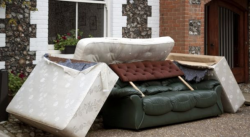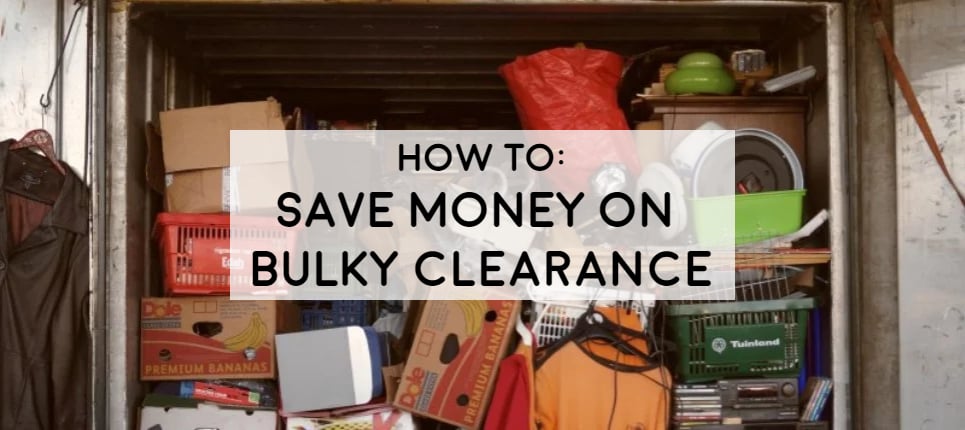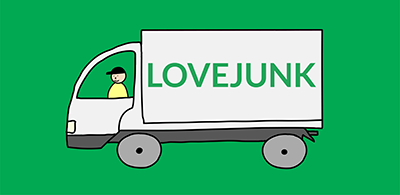How to Cut the Cost of Bulky Rubbish Removal
Getting rid of bulky rubbish can be expensive!
Below are our top tips on how to save some money when you next need to get rid of some bulky waste.
- Can it be reused?
- Use a House Clearance company, not a rubbish removal company
- Take it to your nearest civic amenity site
- Use your council’s bulky household waste collection service
- Break down the waste before it’s collected
- Get your kitchen fitter to remove the waste for free
- Share the problem with a neighbour or two
- Use skips for the heavy stuff and use man & van rubbish clearance for bulkier lighter waste
1. Can it be reused?
Before sending anything to the dump, it’s always worth asking the question ‘Could it be used by someone else’? If it’s in reasonable condition, clean and in working order, the answer is almost always ‘yes’. If you’re feeling generous and live somewhere with good footfall, by far the easiest and greenest solution is to pop it outside your home with a sticker on it saying ‘PLEASE TAKE ME’.
Alternatively, you can donate it to one of a number of charities that will send a van to your home to collect. Try Furniture Donation Network or Reuse Network to find a charity in your area – but do bear in mind they are not a free rubbish removal service and do actually want quality items they can sell!
Another option, if you’d rather earn a bit of money, is to use a website like eBay or Gumtree. Drawbacks are the time and effort it takes to do this, and also the slightly scary issue of random buyers coming to your home to collect. But if you’re feeling trusting, have the time and like taking photos – go for it!
You may even want to consider upcycling your item – sometimes, all a piece of furniture needs is a lick of paint. There’s plenty of upcycling inspiration on the internet – check out this upcycling for beginners article.
2. Use a House Clearance company, not a rubbish removal company
The difference between a rubbish clearance company and a house clearance one is that house clearers earn most of their money by reselling what they collect, rather than charging people to take away their stuff. Rubbish clearance companies simply provide a service to remove your waste. The point is that a house clearance company may often charge very little or sometimes even pay you to clear your junk if they see enough nuggets of potential resale value to cover their costs and make a tidy profit.
So, if you think you have some gems amongst your junk, it’s worth getting a local house clearance company round to give you a quote to remove the lot.

3. Take it to your nearest civic amenity site
Assuming you have access to a vehicle, then loading up your stuff and driving it to your local tip is definitely the cheapest way to dispose of bulky waste. The vast majority of tips don’t charge anything to take your waste provided you can prove you are a local resident and don’t deliver it in a commercial vehicle.
Don’t forget that last point by the way. Most council tips either prohibit entirely or charge to receive commercial or trade waste – so think twice before hiring a van to deliver your old kitchen to the tip.
4. Use your council’s bulky household waste collection service
Every council is legally obliged to provide residents (not businesses) with a subsidised home collection service for bulky household items you cannot put in your bin. The service tends to be restricted to household items like furniture, mattresses, carpet, appliances (like fridges) and bric-a-brac and excludes builders waste and DIY waste. It’s rarely free, but it is subsidised – so will typically be cheaper than using a private rubbish removal solution.
If you’d like insights on how much your local council bulky waste collection service costs, we have created guides covering council-by-council costs in England. If you live in London and would prefer a more detailed version, we have broken down how much it costs to dispose of a fridge, mattress, sofa and combination of all three by each London council.
The downside of a council collection are that the limitations placed on what can and cannot be taken and also service levels aren’t super slick. For example, you may have to wait a week or so to arrange a collection and many councils only collect from outside the property or charge a substantial premium to collect from inside. But you pays your money and takes your choice as they say!
A typical example of a council bulky waste collection service can be seen here.

5. Break down the waste before it’s collected
Unless the junk is extremely heavy, rubbish clearance and skip hire companies charge by the volume of waste collected. So if you’ve got the energy and time, it’s always worth dismantling items, particularly light furniture, to reduce its bulk so it takes up less space in the van or skips. On a side note, don’t expect rubbish clearance companies to do lots of breaking down for you. Yes – if they’re nice people, they’ll give an old IKEA chest of drawers a nudge so it collapses into a few pieces of MDF, but they aren’t a demolition team.
So if you think something can be reduced in size, we recommend dismantling yourself before the rubbish clearance crew arrives.
6. Get your kitchen fitter to remove the waste for free
Waste removal is often overlooked at the time of arranging you’re new kitchen installation or other home improvement or repairs work. Contractors regularly leave their customer to organise and pay for the waste or, if asked, add on the cost to the bill. We recommend raising waste disposal just before you sign the line with your kitchen company to go ahead with the works.
Ask them to include the cost of waste disposal and you’ll sign today. You’ll be amazed at how many will say yes.
7. Share the problem with a neighbour or two
Like many things, if you order in bulk it works out cheaper. Waste disposal is no different. In other words, if you only have half a skip’s worth of rubbish, then rather than hiring a small skip or a small man & van collection, it will be more cost-effective teaming up with a neighbour or two and splitting the cost of a larger one.
Everyone, even your neatest neighbour, has junk somewhere in their home they’ve meaning to throw out for years!
8.Use skips for the heavy stuff and use man & van rubbish clearance for bulkier lighter waste
Without getting into the technicals of why, if you have a lot of heavy, mucky waste like soil and rubble, it normally works out more cost effective using a skip to get rid of it. Skips are also useful for containing that type of waste as you generate it.
On the other hand, man & van rubbish clearance is normally 10%-30% cheaper than skips (even before you add on extras like skip permits and parking suspensions – which is required for skips when placing on a public highway) for the general bulky waste.
So if circumstances suit, it’s worth considering splitting your waste between these two solutions.
Other resources
If you need more guidance on rubbish clearance, you might like some of our other helpful guides:












